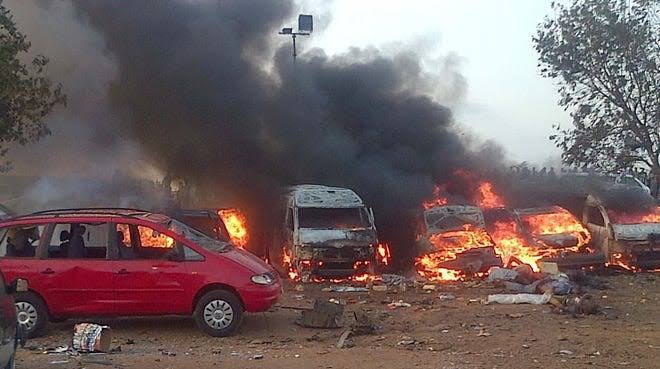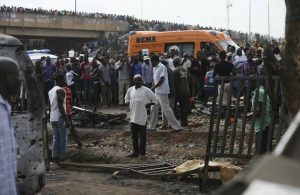Remembering Nyanya Bomb Attack As Victims Complain Of Government Neglect

April 14, 2014 is significant in Nigeria’s modern history. That was the day that the Boko Haram terrorists abducted 276 secondary school girls in Chibok, Borno State.
It is also the day that the terror group launched a bomb attack in Nyanya, Abuja, Nigeria’s capital and dug a knife in the soul of the once easy-going city.
The attack claimed no fewer than 71 lives and caused injuries to more than 200 others.
The casualties were high because the attack occurred at peak period at the Nyanya Park, which is a transit point for FCT and numerous communities in Nasarawa State hosting low income workers.
The park has since been abandoned by commuters who prefer to line up along the Abuja-Keffi Highway where it is located to commute in private vehicles in spite of the fact that the facility has been rebuilt.
Immediately after the attack, the Federal Capital Territory Administration, then headed by Malam Balance Mohammed, the Governor of Bauchi State, promised to pick up the medical bills of the wounded for them to overcome their pains.
The FCT Permanent Secretary then, Mr John Chukwu, directed that hospitals in the FCT where victims were taken give them adequate care as the FCT Administration would pick up their bills.
He also directed the FCT Health and Human Services Secretariat and the FCT Emergency Management Agency to redouble efforts and that serious cases be urgently referred to specialist hospitals to mitigate the victims’ pains.
Six years after the attack, the victims say that none of the promises of the government was fulfilled.
A victim, Mr Celestine Anaigbo, said that he had since undergone series of surgical operations since then without any help from the government.
Anaigbo said that when he was abandoned in the hospital he had to seek for help from family, friends and church members.
“I have carried out two surgical operations on my legs at Cedar Crest Hospital and I still need to go back for some correction, I spent three million naira for the two operations.
“When I was looking for help, I visited many radio stations to seek for assistance but to no avail.
“As of now I need almost another three million naira for the three operation but do not have such,”he said.
Another victim, Mrs Prisalia Chinadu, said she had to pay her bills at Nyanya General Hospital where she was taken to after the blast.
Chinadu said she was moved to Gwagwalada Specialist Hospital to continue her treatment through the help of family and friends.
She said that the government promised to take care of the medical bills but did nothing.
“After all the promises we were left to fate without any support from the government,’’ she said.
Mrs Christiana Agbo, also a victim, said that she was abandoned at the hospital.
Agbo said the family had to take her home to use local medicines to treat her burns.
She said the family had spent all its resources on managing her case.
The husband, Mr Steven Agbo, said he had been taking care of his wife since
the government could not fulfil its promises.
“I have spent all I have on her treatment with the help of well-wishers.
“It is unfortunate that a government of a country will make a promise
and will not keep to it,’’ he said.
Also, two women who lost their husbands, Mrs Favour Ndubisi and Mrs
Sarah Andy called on government to empower them to enable them to take
care of their children.
“I am a qualified teacher but due to the lack of job I teach in a private school where the salary is very small; if government will employ me, I will be happy,’’ Ndubisi said.
In 2015, the bomb victims had gone to the National Assembly to protest and seek its intervention on their plight.
Mr Victor Dike, who represented the Sergeant-At-Arms for the Senate, during the protest, promised to look into their case.
“I promise to look for the solution to their problem through the letter they submitted and once we get the letter I will tell them the action they have taken on the letter and that is the normal procedure,” Dike said at the time.
Support Our Journalism
There are millions of ordinary people affected by conflict in Africa whose stories are missing in the mainstream media. HumAngle is determined to tell those challenging and under-reported stories, hoping that the people impacted by these conflicts will find the safety and security they deserve.
To ensure that we continue to provide public service coverage, we have a small favour to ask you. We want you to be part of our journalistic endeavour by contributing a token to us.
Your donation will further promote a robust, free, and independent media.
Donate Here





